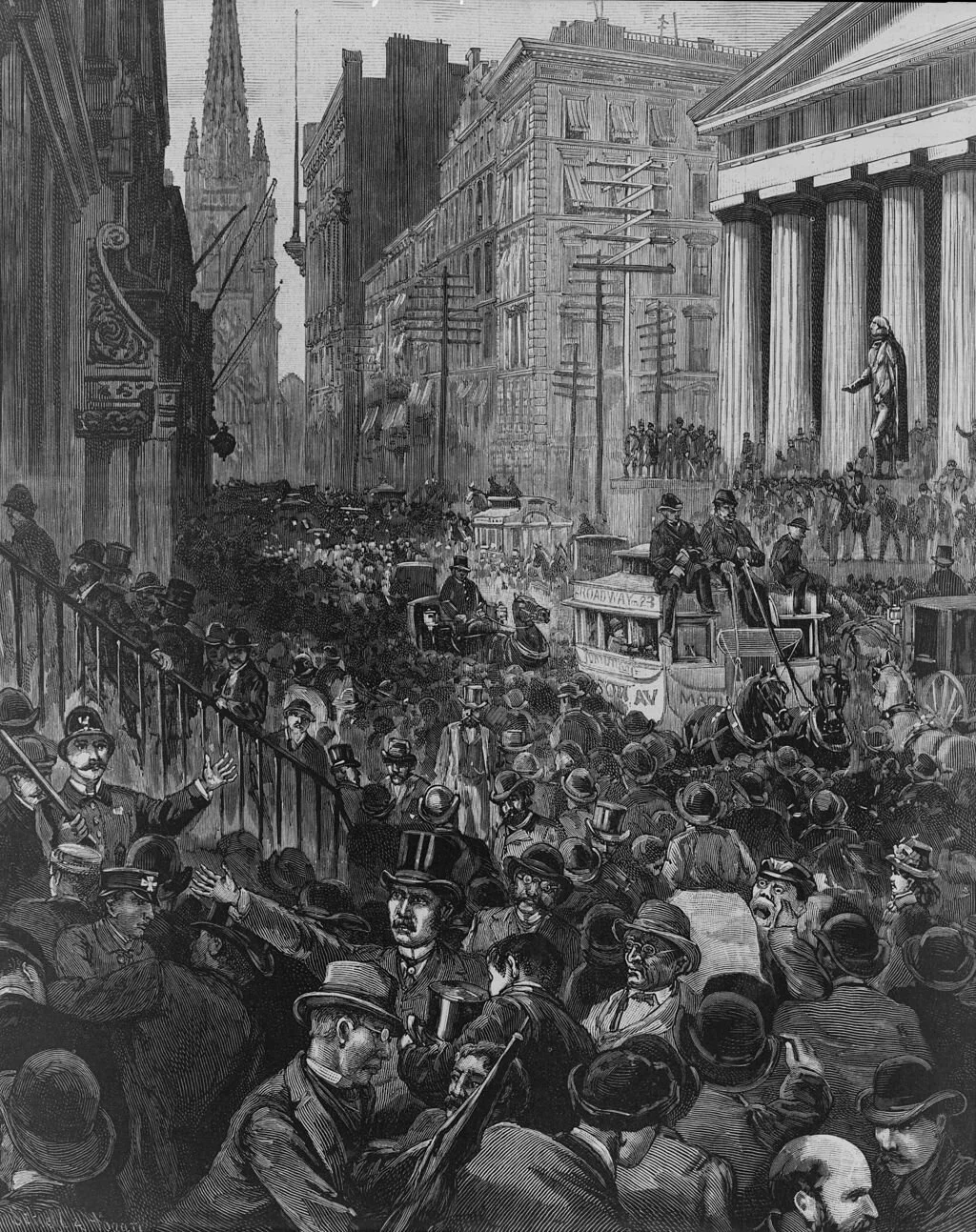David Warsh: 'How do economic crises end?' and other mega-questions
Wall Street on May 14, 1884 during a panic
— From Harper’s Weekly
SOMERVILLE, Mass.
Economists are occasionally accused of physics envy, because some of the mathematical language they use to describe, say, the interdependence of supply and demand was originally devised to explain equilibrium in celestial mechanics.
In the current crisis, economists may be suffering from physician envy. Every day brings reassuring new evidence of the depth of knowledge that life scientists, public health experts and medical doctors are bringing to bear on the COVID-19 pandemic.
Economists have ample reason to be proud of themselves. I can’t prove it, but I can demonstrate to anyone willing to learn, thanks to a regular series of short analytic memoranda published by a non-partisan Web site with the slightly in-your-face name of EconoFact.
EconoFact, published by the Edward R. Murrow Center of the Fletcher School of Tufts University, was founded in January 2017 by Michael Klein, of Tufts, and various colleagues. A former chief economist in the Office of International Affairs of the U.S. Treasury Department, Klein was accustomed to writing policy briefs laying out options for decision-makers, So were many of his friends.
Dissatisfied with what they regarded as overmuch weight being given to fringe views by news accounts and op-ed pages striving for balance, they aimed to convey to key journalists and others affecting policy in Washington and state capitals the scope of differences among mainstream views. Contributors, many of them with government experience, have since grown to a network of nearly a hundred economics professors.
Unlike the National Bureau of Economic Research, the leading U.S. consortium of research professors, the charter of which specifically forbids advocacy in its sponsored research, EconFact authors begin with the premise that action is required and then briefly lay out possibilities. Project Syndicate, an online op-ed page promoting the work of some 75 leading economists, makes interesting reading; so does Vox-EU, edited by Richard Baldwin, of Geneva’s Graduate Institute, and published by the Centre for Economic Policy Research, the European counterpart of the NBER.
Compared to these, EconoFact has a much tighter focus. Its headings include
Immigration Policy, Federal Budget Deficit, Jobs and Employment, and Coronavirus. Nine briefs on the COVID-19 crisis have been published in the last two weeks, each around 1,300 words. You can read them individually below, or scan them serially here.
When will the US be able to lift social distancing restrictions and begin to restore its economy? by Hoyt Bleakley, University of Michigan (March 26)
How many workers are likely to need cash income assistance during this economic slowdown? by Melissa Kearney and Luke Pardue, University of Maryland (March 26)
What do interpretations of the Great Depression and the Financial Crisis of 2008 suggest about how the current crisis might end?, by Dan Sichel·
Wellesley College (March 23)
How much additional funding and what modifications to the system of unemployment might be required in the current crisis?, by Patricia M. Anderson and Phillip Levine, Dartmouth College and Wellesley College (March 22)
What is the appropriate infrastructure to disburse cash payments rapidly and fairly, given that those most desperately in need are often the hardest to reach?, by Lisa A. Gennetian, Sanford School of Public Policy, Duke University (March 20)
How to rate speed as a factor in an economic policy response? by Megan Greene and Michael Klein, Harvard Kennedy School Fletcher School, Tufts University (March 17)
What lessons can be drawn from experience of the 1918 influenza pandemic? by Phillip Levine and Robin McKnight·Wellesley College (March 17)
What is the Federal Reserve doing to stabilize market affected by closures and quarantines? by Kenneth Kuttner, Williams College (May 15)
My favorite of these is “How Do Economic Crises End?” because of its obvious sophistication. Sichel, its author, retired from the Fed in 2012, having been part of its senior analytic team in the years before and after the 2008 crisis. The comparison he makes between the unaddressed banking panics that ushered in the Great Depression and the quickly confronted Panic of 2008 has not yet become a standard feature of Coronavirus crisis discussion.
It opens the door for more careful attention to resemblances and dissimilarities of current shutdowns to the events of 1929-1933 and their aftermath. And it identifies common denominators in the ends of both major crises: “two ingredients are needed to stanch the acute phase of an economic crisis,” it states: “a resolution of the underlying cause and a dramatic economic policy response that mitigates the economic damage and causes a shift in sentiment.”
About that slightly pugnacious name: It may be just me, but at a time when claims to deliver “truth” are being bandied about in marketing campaigns as if it were something easy to know, even a claim to having assembled the relevant facts seems a little immodest.
Executive editor Klein demurs: “We back up everything we publish with lots of hyperlinks to sources; so maybe EconoFact is not so much in-your-face as accurate, perhaps even revelatory, that is “revealing something hitherto unknown.” The work we publish is probably not news to trained economists, but may be so to the public who are regularly fed a diet of “Experts disagree about ...” (fill in the blank) when, in fact, there is often broad consensus among economists.
“Too often news media treat economic matters like a sports event with a lonely and unsupported economist on one side and someone else (who represents the consensus view of economists who have spent their professional careers studying these issues) on the other.”
EconoFact is looking for long-term funding. It wouldn’t cost a fortune to keep a couple of editors and an intern employed. Here’s hoping those deep pockets can be found. The name, no doubt, is here to stay. Long may the enterprise continue to ask and answer pointed questions.
David Warsh, an economic historian and veteran columnist, is proprietor of economic principals.com, where this essay originated.


